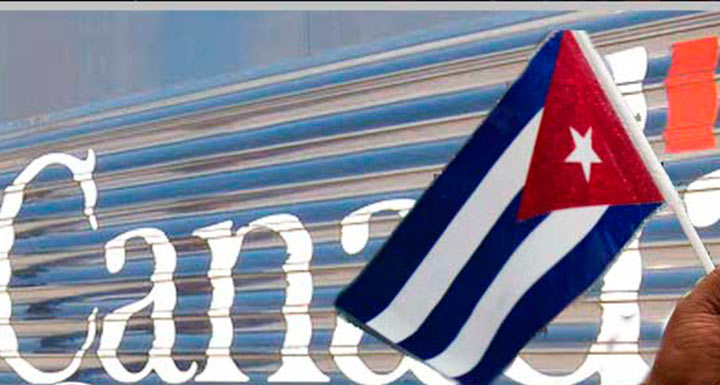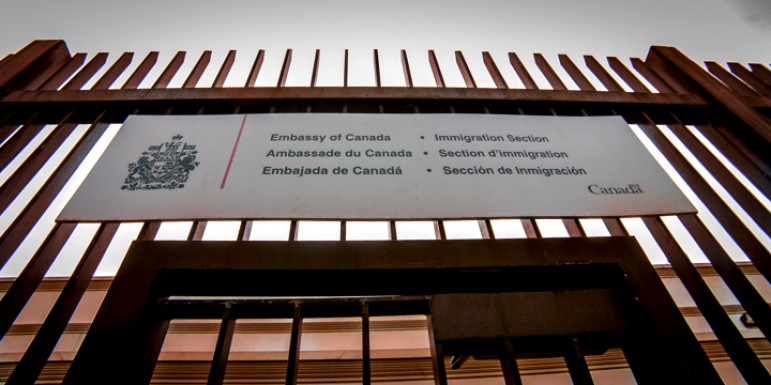
Destination Canada
HAVANA — Another emigration route to a country north of the United States maintains a constant flow of Cuban youths. Some see it as a gate to the future, while others see it as a simple talent drain encouraged by the interests of a developed country.
“Basically, it’s white-collar brain thievery,” says Pacheco*, a 30-year-old resident of Havana who some months ago planned unsuccessfully to emigrate via the Qualified Workers Program that Canada applies in Cuba and the rest of the continent.
According to data in the Social Media Week of Toronto, by 2015 the number of Latin American people living there will be 740,000.
A great many of the Cubans who have opted for that plan of emigration are young people, generally with a college degree, who, beginning in 2015 will witness the arrival of new compatriots, following the announcement of an “express method” to facilitate the immigration of qualified workers from all over the continent.
The experience so far points to a process that takes two to three years to complete and generates difficulties for many of the newcomers to qualify in a “pitiless” labor market in another language, with few guarantees of stability and dizzying dynamics.
Nevertheless, the costs are lesser than the benefits, in the opinion of the hundreds of Cubans who continue to try to enter a nation founded and sustained by immigrants.
Bound for maple-leaf country
“My brother already lives there, and more or less guided me. The first thing I did was to take up French in my fifth year in college, because, for most people, the most complicated thing about living in Canada is the language,” says Santiago*, who graduated in Computer Sciences from the University of Havana.
“The other thing is that everything is expensive,” he adds. The total cost of applying, legalizing documents, sending them via DHL, private French lessons (5 convertible pesos each), legal consultations, visa applications, medical check-ups and even bribes to shorten the wait, is between 2,000 and 3,000 convertible pesos.
Besides, “there’s a pile of papers” that need to be collected and certified. Santiago begins to list them, and 20 minutes later concludes that “it’s stressful. That process is something that I’d pay someone to do for me,” he says. (2)
The paperwork is based on a points system.
“I don’t have enough points to skip the interview. I lack about five points. But now I have two years of work experience, and that’s two points more. Because the process takes so long and most of the time the papers are put away, an applicant can update his file. ‘Look, I had a child’ (children are worth points because they serve to repopulate Canada) or ‘I got married.'”
“So, you’re going to get married, have children?”
“Yes, I posted an ad in Revolico: ‘Wanted: a wife with child,'” Santiago jests. “People do that and I almost negotiated it a couple of times. But in the end, getting married is complicated because over there they take matrimony seriously. You have to live there for a year before you can get a divorce and I’m not ready for all that drama.” (3)
Both Pacheco and Santiago have numerous reasons to emigrate.
“It’s the economic issue, the eternal crisis, but I have a thousand and one other reasons,” says Pacheco. “Having a better lifestyle, above all. Not just economically or politically but also having the freedom to do more things.” The computer scientist has friends his own age working in companies like Google and Facebook. (4)
Pacheco, an economics graduate, knows that he won’t arrive in Canada and immediately work in his chosen profession, “but I won’t starve either, for sure. I worry about my present, and here [in Cuba] there’s little future. Not only for me but for you, for anyone.”
“Will you try it again?”
“Sure, of course.”
 Getting there is an end and a beginning
Getting there is an end and a beginning
Ginella Díaz was well known in Cuba because of a TV project for youths that was broadcast throughout Cuba from her province, Sancti Spiritus. But her “minutes of fame” were not enough to satisfy her ambition.
“Even though I had a good job and salary, I decided to leap into the First World to improve my quality of life and that of my parents,” she explains.
“In my case, it was a very long process,” she recalls. “It took four years. At the time I began the process I had no access to the Internet or to e-mail. For that reason, my Canadian friends obtained the necessary forms, sent them to me, I filled them and returned them so my friends could deliver them to the Canadian Embassy in Mexico City. I didn’t want to send them directly from Cuba, for fear that my efforts became known.”
Like every other newcomer, Díaz got several “survival” jobs, until she found employment at Radio Canada International as a reporter for the Latin American Department. However, budget cutbacks put her back on the streets. It was “a very hard blow,” she says.
“That period was harder than the arrival, because I no longer could be satisfied with a survival job after the professional experience I had gained,” Díaz says. “Now I’d have to convince my possible employers that I, an immigrant, could do a job in French communications better than a native French-speaker. The task was titanic but I succeeded after five months of sending out hundreds of résumés.”
“Since June 2013, I’ve worked as a communications and public relations agent for an employment center in Montréal. Radio and television are now my hobbies. C’est la vie!” she comments.
“Canada is not exactly as advertised, so us Cubans are not the only ones who lie,” says Yenier Gómez Manresa, an accounting graduate who learned about the program in his second year in the university. After he read the requirements and weighed his chances, he waited eight years to apply.
“I don’t want to seem hypocritical if asked about the future of young people in Cuba, but neither do I believe that this program in Canada should be considered a ‘future’ for anyone who leaves [Cuba] with less than 1,000 or 2,000 dollars. For those who leave with 80 dollars in cash, as I did, the struggle is very tough,” says Gómez with a pessimism belied by his own experience.
Also at the far end of the realization are cases like Diana* and Fausto. She, who becomes depressed every winter and is saddened by the lack of sunshine, has been fired on several occasions because she cannot reconcile her attitude with the rules of the game of another culture. He cannot tell his story because, in a deep depressive crisis, he took his own life after spending 25 years in Canada and trying systematically to move to Miami.
Between these two extremes swing the experiences of insertion of the immigrants, Cuban or from other nations, who seek opportunities in a highly developed society where life is run by a system that prioritizes opportunity, not always talent.
“I began doing roofing and, from all that work, I didn’t gain a pound for six months. Later, things changed and in a shop where I did all jobs the administrators read my résumé and allowed me to work in accounting, handling the receipts and shipments,” says Yenier.
“There, I shot upward, because I wasn’t into stealing supplies or anything like it,” he says, laughing. He was promoted to buyer and works there still.
Yenier says it is difficult for Cubans to find jobs in the professions they studied in their homeland, but he has finally achieved success. A similar experience is told by Yansulier García Álvarez, a young journalist who, in addition to being a store clerk, reports for a Hispanic channel in Montréal.
“Once I heard in a Round Table TV discussion [in Cuba] that these immigration programs for professionals are not so much a theft of brains as a waste of brains. I don’t think they are,” says García, assuming a stance in a debate where lamentations abound over the loss of professionals by a poor country.
Personal will and the search for better opportunities overcome the objections to the obvious advantage of hiring prepared workers for little money. While the social and economic policies of an underdeveloped country like Cuba fail to transform the island into an option for life and future, especially for young people, the emigration routes will continue to point to First World countries.
The critical voices are silenced every time that another Cuban fills the applications to begin his private journey to Canada.
*Pseudonyms used at the request of the interviewees.

